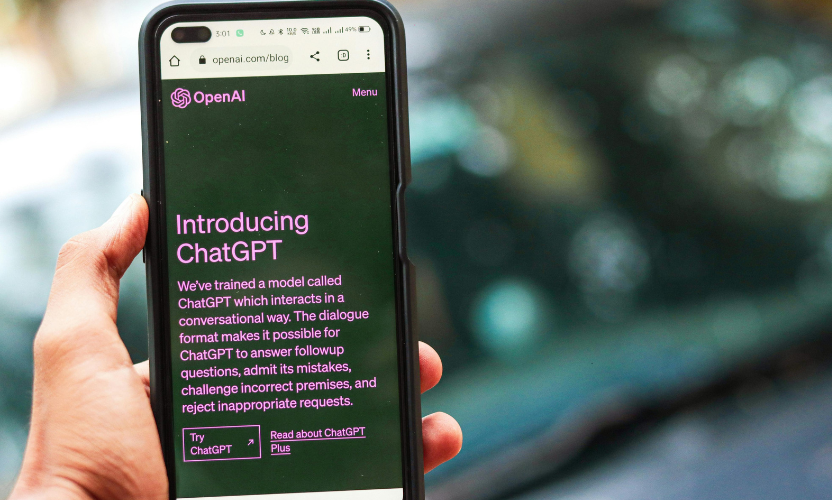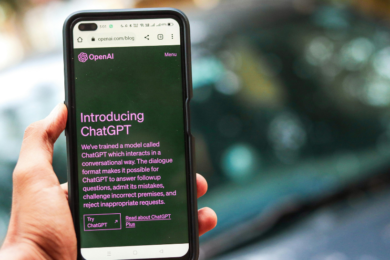Five Marketing Predictions for 2025
Jan 2, 2025By this point, most marketers have become accustomed to the never ending whirlwind of change and evolution in the digital…

When the likes of ChatGPT, Gemini and MidJourney exploded in popularity around 2023, digital marketers everywhere were immediately on alert. The digital space has always been a never ending roller coaster of changes and updates, for most of us, it’s why we love it so much! However, when generative AI entered the picture, it was obvious. This would be a game changer.
Thanks to its rapidly growing capabilities, any thoughts of AI being a passing trend were quickly squashed. In fact, the only real question was, how long would it take for generative AI to become engrained in daily life?
As it turns out, not long at all. Fast forward two short years and here we are, in one form or another AI has become embedded in almost everything we do, and not just in terms of marketing!
All of the latest smart phones now come ready-loaded with their own AI assistants, smart homes utilise AI to automate tasks like adjusting the temperature, lighting and security systems, our vehicles are becoming more and more autonomous thanks to the powers of artificial intelligence. It’s fair to say, the rise of AI has been quicker than almost anyone could have imagined.
So, after sending ripples throughout the world, and altering the face of digital marketing in such a short space of time, AI has left us SEO professionals with some pressing questions. Starting with the biggest, will AI replace Google Search?
No. AI won’t be replacing Google. In fact, Google is actually one of the front runners in the AI race. They’ve released Gemini, integrated Search Generative Experience (SGE) and AI Overviews directly into its search engine, all with the aim of enhancing and complimenting their traditional algorithm to make it even smarter and more intuitive to user needs.
One of the primary reasons for the increase in people asking “Is AI replacing Google?” is the recent predictions made by Gartner, a renowned research and advisory organisation.
They have projected a significant shift in how people access information. According to their recent forecast, the use of traditional search engines such as Google is expected to decline by 25% by 2026.
This anticipated drop is largely attributed to AI-driven chatbots like ChatGPT and Gemini, which are transforming the way users seek answers and interact with digital resources.
Absolutely not! Google Search is evolving instead of disappearing. By adopting AI, Google is focusing on delivering more personalised and accurate results. While the landscape of search is changing, Google Search is still adapting with new technologies and evolving to further meet user expectations.
Even if the predicted 25% decline in the use of traditional search engines like Google search does pan out, their 89.73% of the current market share ensures that they would still be the go-to for the vast majority of all searches.
Despite the likelihood of Google remaining the biggest player in the world of search for the foreseeable future, it doesn’t mean that digital marketing professionals won’t have to adapt. After all, if as Gartner predicts, 25% of users move to using the likes of ChatGPT to conduct their searches this would essentially make AI Search an entirely new marketing channel for strategies to use.
Powered by cutting-edge machine learning and natural language processing, AI search engines go beyond basic keywords to deliver contextually relevant, highly personalised results. These systems don’t just answer questions, they understand your intent and provide precise, actionable insights tailored to your needs.
Whether it’s empowering researchers with deep insights or transforming how we shop online, AI search is redefining how we connect with information.
It all comes down to what you need .For quick, fact-based queries or up to the minute information, Google is unbeatable. With its constant internet indexing, it provides instant answers, links to resources and the latest news all at your fingertips. With SERP videos increasing too, integrating content marketing strategies will shape SEO success.
When it comes to diving deeper, brainstorming creative ideas, exploring complex topics or having a more interactive, thoughtful conversation, ChatGPT is a clear winner. Whether you’re looking to get context-driven insights, refine your approach to a problem, or even just explore a topic in a conversational way, ChatGPT offers an added layer of understanding that goes beyond surface level information.
All in all, each platform excels in its own way, and as a digital marketer, combining the unique strengths of the two can unlock a whole world of possibilities.
Whether AI “replaces” Google or not, the real winners will be those who embrace its potential and take action; your ability to adapt now will be the key to success in the evolving digital landscape.
It’s time to shift from traditional SEO strategies to creating contextual, user-first content that aligns with how AI-powered engines process information to maintain search success. These engines thrive on clear, structured and engaging material, so it’s crucial to develop content that is both informative and easy to navigate. Break down complex topics into easy-to-digest sections, incorporate conversational keywords and focus on FAQ-style content that matches AI’s natural language processing capabilities.
Additionally, consider integrating schema markup to ensure your content is machine readable and ready for AI engines to feature prominently in search results. The clearer your content’s structure, the better it performs.
Don’t put all your eggs in one basket. While traditional search traffic has been a key driver for years, its importance may decline with AI reshaping how people find content online. Diversifying your marketing channels is more essential than ever.
Explore opportunities in paid ads, social media and even traditional channels such as email marketing to ensure you cover all bases . These platforms allow you to tap into new audiences and build engagement in innovative ways.
In the age of AI and increasing transparency concerns, trust is arguably the most valuable currency for your brand. Consumers are becoming more discerning about the content they engage with and upholding credibility will set you apart from competitors.
This is where the E-E-A-T principles (Experience, Expertise, Authoritativeness, Trustworthiness) come into play. Fact-check all your information rigorously, cite credible sources and maintain rock solid editorial integrity. Providing honest, accurate and well-researched content will keep your audience coming back for more.
Showcasing testimonials, case studies and user-generated content is also an effective way of enhancing your credibility. People trust other people and these assets can demonstrate your brand’s reliability in a relatable way.
At Extramile, we’re already thinking ahead by integrating AI-driven tools into our search strategies, optimising content for AI-powered search engines and leveraging machine learning to streamline our processes.
This forward thinking approach allows us to work alongside our clients and develop future proof digital marketing, web design and web development strategies, ensuring optimal digital performance for your business.
Want to ensure your business is equipped to handle the changing landscape of search? Speak to our team today to discover how we can help you navigate the future of AI and search.

By this point, most marketers have become accustomed to the never ending whirlwind of change and evolution in the digital…

Every year, Extramile sends some of its digital marketing team to BrightonSEO to learn advances in the search world, and…

Did you know that out of the estimated 5.44 billion users accessing the web, approximately 64.04% of all traffic can…

When the likes of ChatGPT, Gemini and MidJourney exploded in popularity around 2023, digital marketers everywhere were immediately on alert.…